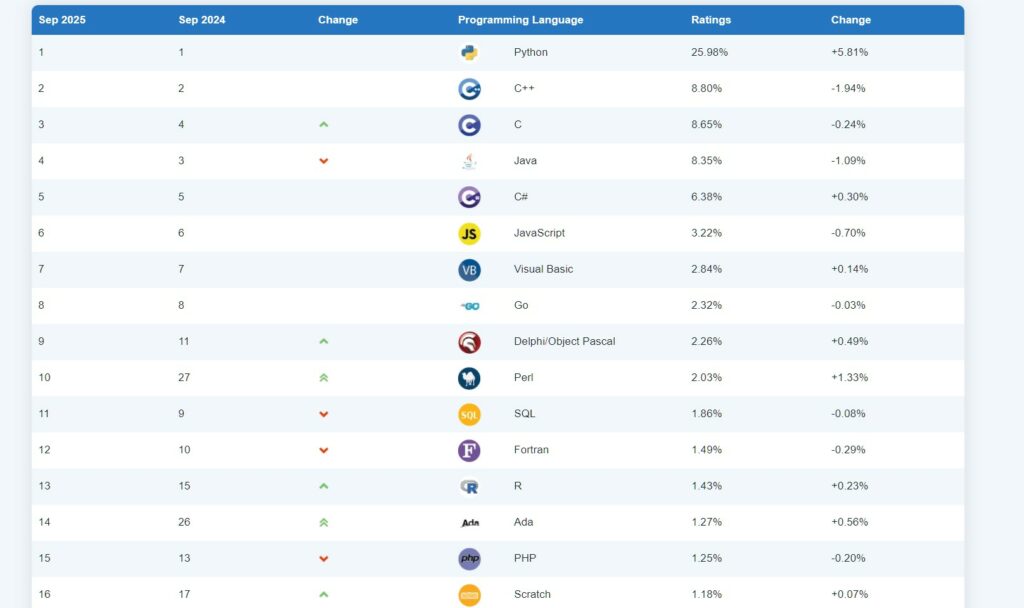
TIOBE Software ha pubblicato la classifica di settembre dei linguaggi di programmazione più popolari. Il momento clou della pubblicazione è stato il ritorno di Perl nella top 10, balzando dal 27° al 10° posto.

Solo un anno fa, Perl era considerata un “outsider“, ma ora il suo indice è del 2,03%. Per fare un confronto, era del 2,08% ad agosto e dell’1,76% a luglio. Questa crescita è particolarmente notevole se si considera che durante gli “anni d’oro” di Perl salì al terzo posto in classifica (marzo 2005), per poi scendere per decenni.
Secondo il direttore di TIOBE, Paul Jansen, la spiegazione tecnica di questo aumento risiede nell’elevato numero di libri su Perl disponibili su Amazon: ci sono quattro volte più libri su Perl che libri su PHP e sette volte più libri su Rust. Tuttavia, le vere ragioni di questo aumento rimangono poco chiare.

Lo stesso Jansen suggerisce che la comunità stia adottando sempre più Perl 5 come linguaggio “principale”. La storia di Perl 6, in seguito ribattezzato Raku, durò quasi due decenni e portò a un rallentamento nello sviluppo di Perl 5. Molti sviluppatori passarono quindi a Python. Oggi, Perl 6/Raku si classifica solo al 129° posto nell’indice e non ha praticamente alcun impatto sul settore, mentre Perl 5 riceve aggiornamenti regolari e sta tornando ad attirare l’attenzione.
A settembre, Python ha mantenuto il primo posto con il 25,98% (in crescita del 5,81% su base annua). C++ è rimasto al secondo posto (8,8%), seguito da C (8,65%) e Java (8,35%). Anche C# è entrato nella top five (6,38%). JavaScript rimane al sesto posto (3,22%), seguito da Visual Basic (2,84%) e Go (2,32%). Delphi/Object Pascal è salito al nono posto (2,26%), seguito da Perl. SQL, Fortran e PHP, invece, hanno perso terreno.
Altri cambiamenti degni di nota includono un crescente interesse per Ada (14° posto, in crescita di 12 punti) e R (13° posto, in crescita di 2 punti). Rust, MATLAB e Kotlin hanno perso terreno.
La classifica TIOBE viene aggiornata mensilmente e riflette la popolarità dei linguaggi in base alle query di ricerca su Google, Amazon, Wikipedia, Bing e oltre 20 altri servizi. Non classifica il “miglior” linguaggio o il volume di codice scritto, ma funge piuttosto da indicatore della rilevanza delle competenze e da guida per le decisioni di sviluppo strategico.
I dati storici evidenziano tendenze a lungo termine: Python occupa costantemente una delle prime 3 posizioni dal 2020, C e C++ occupano il primo posto da oltre tre decenni e linguaggi come Delphi/Object Pascal e Ada stanno tornando sorprendentemente in auge dopo una lunga pausa.
Le classifiche della Hall of Fame ci ricordano che Python è stato nominato “linguaggio dell’anno” più spesso, ben otto volte dal 2007. Ma anche C, Java e persino Go si sono distinti nel corso degli anni.
Gli autori dell’indice sottolineano che stanno continuando a perfezionare la metodologia di calcolo. Prevedono di ampliare l’elenco delle lingue di ricerca (ad esempio, includendo la lingua cinese Baidu) e di introdurre indici separati per database e framework.
Ti è piaciuto questo articolo? Ne stiamo discutendo nella nostra Community su LinkedIn, Facebook e Instagram. Seguici anche su Google News, per ricevere aggiornamenti quotidiani sulla sicurezza informatica o Scrivici se desideri segnalarci notizie, approfondimenti o contributi da pubblicare.

 Cybercrime
CybercrimeLe autorità tedesche hanno recentemente lanciato un avviso riguardante una sofisticata campagna di phishing che prende di mira gli utenti di Signal in Germania e nel resto d’Europa. L’attacco si concentra su profili specifici, tra…
 Innovazione
InnovazioneL’evoluzione dell’Intelligenza Artificiale ha superato una nuova, inquietante frontiera. Se fino a ieri parlavamo di algoritmi confinati dietro uno schermo, oggi ci troviamo di fronte al concetto di “Meatspace Layer”: un’infrastruttura dove le macchine non…
 Cybercrime
CybercrimeNegli ultimi anni, la sicurezza delle reti ha affrontato minacce sempre più sofisticate, capaci di aggirare le difese tradizionali e di penetrare negli strati più profondi delle infrastrutture. Un’analisi recente ha portato alla luce uno…
 Vulnerabilità
VulnerabilitàNegli ultimi tempi, la piattaforma di automazione n8n sta affrontando una serie crescente di bug di sicurezza. n8n è una piattaforma di automazione che trasforma task complessi in operazioni semplici e veloci. Con pochi click…
 Innovazione
InnovazioneArticolo scritto con la collaborazione di Giovanni Pollola. Per anni, “IA a bordo dei satelliti” serviva soprattutto a “ripulire” i dati: meno rumore nelle immagini e nei dati acquisiti attraverso i vari payload multisensoriali, meno…